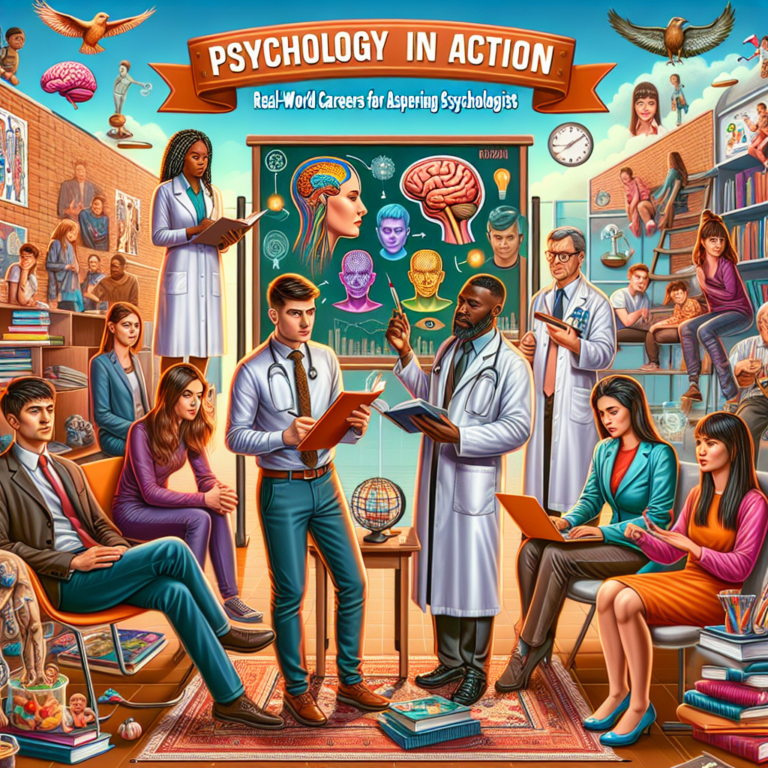Introduction
Imagine waking up each morning with a purpose—equipped to unravel the complexities of the human mind. A degree in psychology offers an extraordinary blend of science, art, and empathy, allowing students to delve deeply into understanding behavior and mental processes. If you’ve ever wondered what it’s truly like to be a psychology student, or what awaits you in this fascinating field, you’re in the right place. This article provides a comprehensive glimpse into A Day in the Life of a Psychology Student: What to Expect from Your Degree, revealing insights that will prepare you for this transformative journey.
Morning Routine: Waking Up to a World of Possibilities
Early Morning Motivation
The day often begins early for psychology students, with many waking up around 7 a.m. to prepare for a combination of classes, research, and social activities. Motivational podcasts or uplifting music may accompany breakfast as students fuel their minds and bodies.

First Class: Introduction to Psychology
By 8 or 9 a.m., students typically attend their first class. An Introduction to Psychology course is common for freshmen, where they explore various psychological theories and seminal studies. Engaging discussions may cover topics like:
- Behaviorism
- Cognitive Psychology
- Developmental Stages
This foundational course introduces students to primary concepts that will shape their understanding of psychology.
Case Study Highlight: The Stanford Prison Experiment
As part of their coursework, students might learn about the Stanford Prison Experiment conducted by Philip Zimbardo. This study provides critical insights into social psychology and ethical considerations, which are crucial for budding psychologists. A brief analysis would emphasize how the experiment demonstrated the power of situational forces over individual personality traits.
Mid-Morning: Theoretical Deep Dives
Libraries and Study Groups
After the first class, many students head to the library or meet with study groups. Psychology involves a lot of reading and analysis. Students may scout for articles in academic journals or textbooks to support research assignments.
Use of Tables and Charts
Creating tables to summarize cognitive theories or behavioral models can aid in understanding complex material.
| Theory | Key Proponents | Application |
|---|---|---|
| Behaviorism | B.F. Skinner | Behavioral Therapy |
| Cognitive | Aaron Beck | Cognitive Behavioral Therapy |
| Humanistic | Carl Rogers | Client-Centered Therapy |
Such visual aids not only clarify concepts but also prepare students for discussions and exams.
Lunch Break: Social Connections and Networking
Campus Life
Around noon, students take a break to recharge. This is often the time for socializing with classmates or participating in extracurricular activities. Students may find themselves discussing various psychological concepts over lunch or preparing for club meetings, such as the Psychology Society. Networking during this time can open doors for research opportunities or internships.
Case Study Highlight: The Impact of Peer Support
Research shows that social connections are vital for mental well-being. Observational studies indicate that students who engage in social activities are more successful academically and emotionally. This emphasizes the importance of community within the psychology curriculum.
Afternoon: The Theory Meets Practice
Advanced Courses and Labs
As the day continues, students may attend advanced courses or labs focused on specialized areas, such as abnormal psychology or neuropsychology. Labs might involve hands-on experience with psychological assessments, studies, or workshops. For example, a class on abnormal psychology could utilize case studies of individuals with mental disorders—allowing students to explore treatment methods and societal impacts.
Practical Applications: Internships and Research Opportunities
Many psychology programs emphasize the importance of gaining real-world experience. Students typically seek internships or research assistant positions, which prove essential when applying theoretical knowledge. These opportunities also aid students in building their resumes.
Evening Responsibilities: Assignments and Self-Care
Study Time
As evening approaches, students return home to focus on assignments. This may include writing research papers, prepping for presentations, or studying for midterms. Peak study hours usually see students engaging in practices like:
- Flashcards for memorization
- Group study sessions via video calls or in-person
- Utilizing online resources like textbooks or academic articles
Importance of Self-Care
Stress management is critical for psychology students, who are often juggling heavy coursework and emotional demands. Time for self-care can include exercise, meditation, or simply unwinding with hobbies. Acknowledging the emotional toll of studying psychology is vital; it allows students to maintain balance and focus.
Night: Reflection and Preparation for Tomorrow
Evening Review
Before heading to bed, many students spend time reflecting on their day, reviewing notes, or planning their schedules for the next day. This routine creates a sense of structure, essential for managing the rigorous demands of a psychology degree.
Case Study Highlight: The Benefits of Reflection
Studies in educational psychology highlight that self-regulation and reflection lead to improved learning outcomes. Such practices allow students to adapt their strategies for future success.
Conclusion: Your Journey Begins Here
Studying psychology is more than an academic endeavor; it’s a journey that instills empathy, critical thinking, and a deep understanding of human behavior. A Day in the Life of a Psychology Student: What to Expect from Your Degree combines rigorous academic challenges with opportunities for personal growth and community engagement.
As you embark on this path, remember the importance of networking, self-care, and continuous learning. Your future as a psychologist or mental health professional is bright, and every day is a step toward becoming an advocate for mental well-being.
FAQs
Q1: What kind of career can I expect with a psychology degree?
With a psychology degree, careers range from clinical psychology to human resources, marketing, and research.
Q2: Do I need a graduate degree to become a psychologist?
Yes, most psychology-related careers, especially clinical roles, require a master’s or doctoral degree.
Q3: What skills will I gain while studying psychology?
Students develop critical thinking, analytical skills, effective communication, and empathy.
Q4: How can I find internships while studying?
Universities often have career centers that assist students in finding internships related to their field of study.
Q5: Is studying psychology emotionally challenging?
Yes, understanding complex emotional issues can be challenging, making self-care and peer support crucial in this field.
Embarking on this journey is an investment in your future, and you have the power to make a difference in the lives of many. Take it one day at a time, and keep your passion for psychology alive!














